TigerVPN Review
In this full TigerVPN review, we're seeing if this basic VPN's consistent speeds, decent UI and ability to access streaming sites make it worth the price and lack of basic features.
TigerVPN is a virtual private network based in Slovakia, designed to secure your browsing activity by laundering it through third-party filters. It’s got a cute tiger mascot and a sleek user interface, but there’s not a lot under the hood. In this TigerVPN review, we’ll look over its features, pricing, user-friendliness, speed, security and more.
In past TigerVPN reviews, we’ve pointed out major security flaws in TigerVPN’s system. Although those are gone, some other issues persist. It’s not all bad, though. TigerVPN’s speeds aren’t bad (though latency is an issue), and it can get you into Netflix.
If you want true quality, though, try one of the heavy hitters on our best VPN list instead. NordVPN ranks at the top, and you can see why in our NordVPN review.
Strengths & Weaknesses
Pros:
- Consistent speeds
- Unlocks Netflix, Hulu & Amazon Prime Video
- Good privacy record
- Simple UI
- In-depth server status page
Cons:
- Almost no features
- No kill switch
- Overpriced
- Slow pings
- Unfriendly website
Alternatives for TigerVPN
- 1
- : PayPal, Credit card, Google Pay, JCB, UnionPay, Bitcoin, Ethereum, X-Coin
- : 10
- :
- :
- :
- :
Average speedDownload Speed90 MbpsUpload Speed9 MbpsLatency3 ms - 2
- : PayPal, Credit card, Google Pay, Amazon Pay
- : Unlimited
- :
- :
- :
- :
Average speedDownload Speed94 MbpsUpload Speed9 MbpsLatency3 ms - 3
- : PayPal, Credit card, Bitcoin, UnionPay, iDeal, Sofort, Giropay, Pixpay, Sepa Direct Debit
- : 8
- :
- :
- :
- :
Average speedDownload Speed91 MbpsUpload Speed9 MbpsLatency4 ms - 4
- : PayPal, Credit card, bitcoin, Amazon Pay
- : 7
- :
- :
- :
- :
Average speed - 5
- : PayPal, Credit card, Amazon, Paygarden, Apple Pay, Google Pay
- : Unlimited
- :
- :
- :
- :
Average speedDownload Speed73 MbpsUpload Speed9 MbpsLatency84 ms
Features
TigerVPN’s feature set is practically nonexistent. Even compared to other VPN providers that aim for mass appeal to nontechnical folks, there’s very little here. It looks more like a hastily made add-on, like Bitdefender VPN, than a stand-alone product.
We expect a few basic options on any VPN, no matter how crude. Users should be able to set the VPN to open on system launch and connect when it’s started up. TigerVPN doesn’t let you do either of those.
There isn’t a kill switch, either, which is a feature we consider essential for a paid VPN service. You can also forget about split tunneling, like you get with PureVPN (see our PureVPN review for details).

From the TigerVPN settings menu, you can do exactly three things: sort the server list alphabetically, show your favorite servers by default and perform a TCP override. Although TCP override is nice — you can activate it to maintain a more stable connection when running the OpenVPN protocol — it doesn’t make up for the absence of everything else.
The selection of supported platforms is also highly limited. For desktop, there are applications for Windows and macOS. On mobile, your choices are iOS and Android. You can install TigerVPN on a Linux system and on DD-WRT routers, but only with gum-and-duct-tape fixes; you won’t get any support from TigerVPN apps.

TigerVPN Features Overview
| Features | |
|---|---|
| Payment methods | PayPal, Credit card |
| Accepts cryptocurrency | |
| Simultaneous connections | 2 |
| Supports split tunneling | |
| Unlimited bandwidth | |
| Free trial available | |
| Refund period | |
| Worldwide server amount | 300+ servers in 42 Countries |
| Desktop OSes | Windows, MacOS, Linux |
| Mobile OSes | Android, iOS |
| Browser extensions | |
| Can be installed on routers | |
| Can access Netflix US | |
| Can access BBC iPlayer | |
| Can access Hulu | |
| Can access Amazon Prime Video | |
| Encryption types | 256-AES |
| VPN protocols available | IPSec, OpenVPN, PPTP, L2TP |
| Enabled at device startup | |
| Allows torrenting | |
| No-logging policy | |
| Passed DNS leak test | |
| Killswitch available | |
| Malware/ad blocker included | |
| Live Chat | |
| Email support | 24/7 |
| Phone support | |
| User forum | |
| Knowledgebase |
Pricing
An overabundance of deals leads to a lot of confusion about TigerVPN’s prices. Once you’ve untangled the web, you can find some reasonably good prices — though nothing that approaches the value and flexibility of Windscribe (see our Windscribe review).
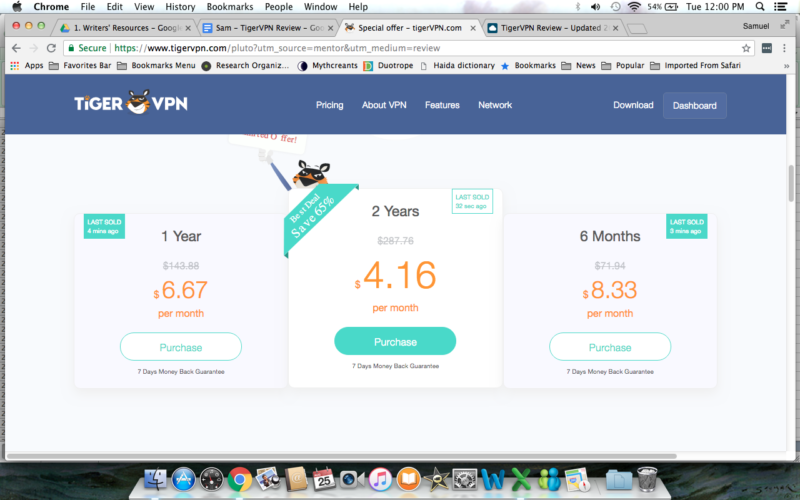
The website includes a page of special promo deals, which is currently the only way to access the six-month and two-year plans. We suspect the two-year deal was supposed to have been cancelled; otherwise, it makes no sense for the two-year plan to charge exactly the same as the three-year plan for only two-thirds of the value.
- Unlimited GB
- 2
- Yes
- Unlimited GB
- 5
- Yes
- Unlimited GB
- 5
- Yes
More plans
- Unlimited GB
- 5
- Yes
- Unlimited GB
- 5
- Yes
Except for the one-month plan, you can use any TigerVPN subscription on five devices at once. Each level of TigerVPN offers unlimited bandwidth and access to the entire server network. Plans for one year and above include free licenses for Shimo (the VPN client for macOS) and Sticky Password (read our Sticky Password review).
Payment methods include credit cards, PayPal, Paymentwall or bitcoin. TigerVPN offers a three-day free trial and a seven-day money-back period on all subscriptions. There’s no free plan, so if you’re looking for a forever-free VPN service, check out our list of the best free VPN services instead.
TigerVPN’s pricing sits perfectly in the middle of the road. It’s not an exceptional deal, but neither is it a reason to run screaming. If you really want to save on a premium VPN, Private Internet Access is the way to go (read our PIA review for more).
TigerVPN Lifetime
TigerVPN briefly offered a lifetime subscription through StackSocial for a one-time price of $25.99. The quality of the service notwithstanding, this is an amazing deal. However, it was just a one-time attempt to boost subscription numbers, and you can’t access it any longer.
Ease of Use
TigerVPN is almost featureless, so it’s not hard to use. VPN newbies will have an easy time navigating its short, aesthetically pleasing menus. Yet there are still some design decisions we could have done without.
TigerVPN’s website is a slog. Every page takes a long time to load, and many of them are dead-ends. Some are only accessible if you leave the website and Google them. A cute mascot is never unwelcome, but after slogging through the same pop-up for the fourth time, we began to suspect the tiger was mocking us.
At one point, our payment was declined because TigerVPN could not determine its risk score. Punishing users for the failure of third-party apps is not a good look.

The customer dashboard is the worst part. On Firefox, it’s completely unusable, blocked by a pop-up window you can’t close. It’s better on Chrome, but the dashboard’s content still intermittently fails to load.
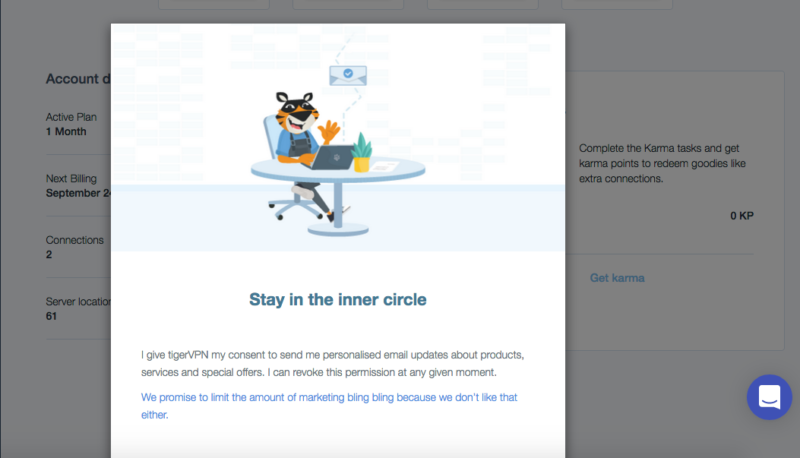
Once out of the website and into the VPN app, things improve significantly. TigerVPN opens from a toolbar icon, so it’s never more than a click away. We appreciate that TigerVPN does away with the classic “one giant button” interface, removing a needless obstacle to controlling the client.

Instead, the server list is the main window. Scrolling is easy, and the search bar is fast and responsive. Our only issue is that you have to search by city names rather than countries. You might be stuck guessing several different cities before you find one where TigerVPN has a server, especially if you live in the United States.
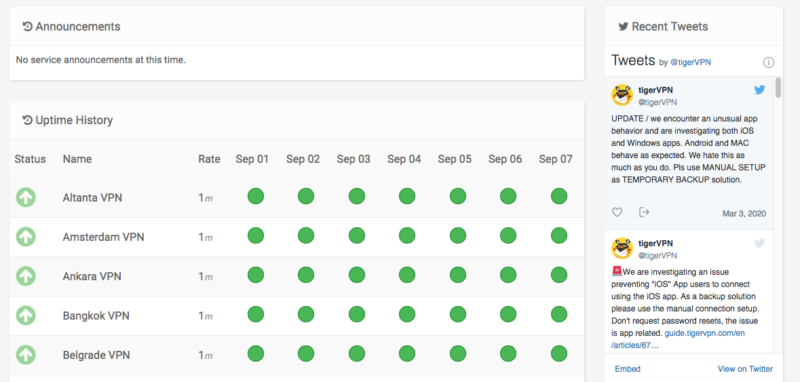
As for TigerVPN’s server status page, it’s great that this exists, since not all VPNs tell you how their servers are doing, but it’s not in the client — you have to go to the website to find it. We get that TigerVPN was afraid to clutter up its UI, but in this case, at least one more menu would have been nice.
Don’t lose hope: there are some VPNs out there that manage to balance user-friendliness with a little more depth. We recommend our reviews of Surfshark and TunnelBear to start.
Speed
TigerVPN’s download and upload speeds are mostly great. No matter what server locations we chose, upload speed hardly wavered, making it an excellent VPN for video chat. On the other hand, it loses some points due to minor inconsistencies and a mediocre latency record.
| Location | Ping ms | Download Mbps | Upload Mbps |
|---|---|---|---|
| Unprotected | 22 | 15.46 | 2.10 |
| Seattle, Washington | 53 | 12.05 | 2.23 |
| New York City, New York | 161 | 7.92 | 2.23 |
| London, England | 353 | 2.94 | 2.35 |
| Sofia, Bulgaria | 395 | 7.26 | 2.27 |
| Tokyo, Japan | 246 | 6.16 | 2.19 |
| Average | 242 | 7.27 | 2.25 |
When we conduct speed tests on a VPN, we aren’t looking for perfection. There’s no such thing as a VPN that doesn’t put any drag on your system whatsoever; even the fastest VPN services slow your connection down a little.
Instead, we look for consistency. For the most part, we found enough of that in TigerVPN’s download and upload speeds for it to compete with our best VPNs for torrenting. The only minor issue was a large slowdown on the London server, but no other servers showed results like that, so it could have been the result of a one-time traffic spike.
The latency is a bigger concern. Ping times more than doubled from our unprotected Portland location to the Seattle server alone, and they kept shooting up the farther away we went. With lag like that, TigerVPN can’t compete with our best VPNs for gaming.
Security
In the past, we’ve had serious concerns about TigerVPN’s security, ever since one of its 2018 releases failed a DNS leak test. We were happy to see that it passed all leak tests this time around, proving itself capable of protecting your online identity without being hacked.
That said, it wasn’t all good news. The test traced our connection to TigerVPN’s server in Washington, then to a server in Oregon, where our test site was located. It didn’t discover our actual ISP, but getting that close is slightly worrying.
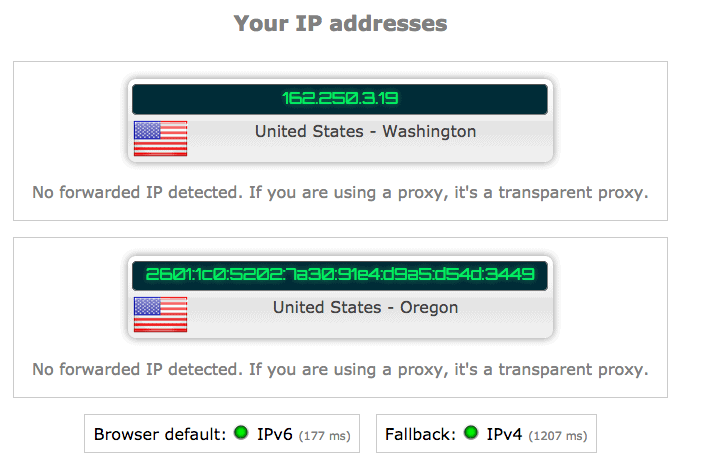
Another factor knocking points off the security score: you barely get to choose your protocol. On desktop or Android, the only option is OpenVPN, though you can toggle between TCP and UDP to try for a more stable connection. Read our VPN protocol breakdown to learn more, but to summarize, OpenVPN is a strong choice that you can’t go wrong with.
On iOS, TigerVPN uses IPSec/IKEv2. This is a fast protocol that’s great at recovering dropped connections, making it well-suited to a mobile device that might be moving in and out of WiFi range. IPSec is slightly less secure than OpenVPN due to being owned by Microsoft; but while it’s not 100-percent transparent, it’s at least solidly built.
For encryption, TigerVPN uses AES-256, a virtually uncrackable code that’s favored by most of the industry. No need to worry about spying third parties here.
Given the IP test’s close call, though, we don’t recommend using TigerVPN if you’re connecting under a strict government, especially China. Try one of our best VPN services for China instead.
Privacy
TigerVPN prominently claims on its website that it “does not store any activity logs anywhere — period. Next question please.” This is fundamentally true, but there is some verbal sleight-of-hand going on.
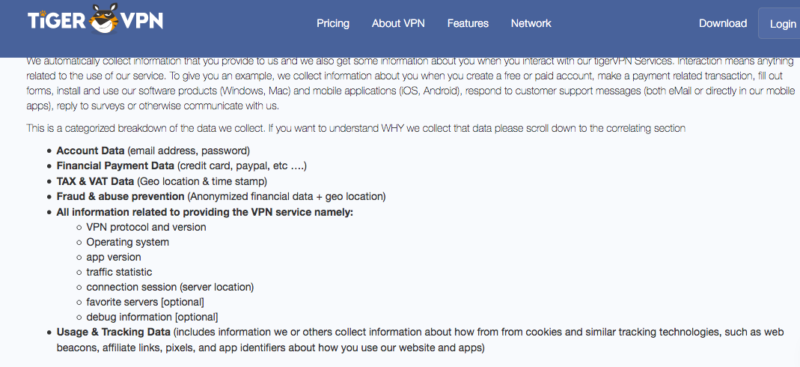
In its detailed privacy policy, TigerVPN admits that it does store some user data, but says none of that data relates directly to browsing activity. A look at the list suggests that it’s telling the truth. TigerVPN stores information necessary to validate your account and tracks your activity on its website with cookies.
The high point of the policy is an apparently complete list of every endpoint where TigerVPN might collect any of your data. It’s a refreshing bit of honesty. At the end of the policy, though, we’re left with some lingering concerns, which we will detail further below.
If you want to know what a well-crafted privacy policy looks like, check out our ExpressVPN review. That service is dedicated to protecting its customers and excels in most other areas as well.
Is TigerVPN Safe?
We have no reason to believe it isn’t, but that’s not always enough to be certain. Unlike some other services, such as IPVanish, there’s no breaking news story about TigerVPN’s failure to abide by its own privacy policies.
The concern comes from the fine print. Although its policy is detailed, TigerVPN collects more data than we find strictly necessary to run a VPN. The list includes the vague data point “traffic statistic,” which could mean anything, including personal information.
TigerVPN also stores your favorite servers centrally. The stated reason is so it can sync your preferences across multiple devices. However, we don’t think that small, extra convenience is worth keeping a log that could be used to build an accurate (if vague) picture of a user’s physical location.
Streaming Performance
Streaming is another bright spot in TigerVPN’s service, especially since it was mediocre last time we checked. While connected to its network, we were able to access content on Netflix, Hulu and Amazon Prime Video. We tried several different servers, and all of them got through.
This is no small achievement. Our article on how to beat the Netflix VPN ban goes into detail on how hard it can be to build a streaming VPN. Even better, TigerVPN’s decent international speeds meant each video played in high quality, without noticeable lag.
The one issue: its UK servers can’t access BBC iPlayer. To get your fill of British TV, check out our list of the best VPNs for BBC iPlayer instead.
Server Locations
The closer you are to a VPN’s servers, the better performance you’ll get. A broader network of servers guarantees that more users will have access to a user-friendly private browsing experience. The average VPN has most of its servers in North America, Europe and East Asia, and few or none in Latin America, Africa, the Middle East or South Asia.
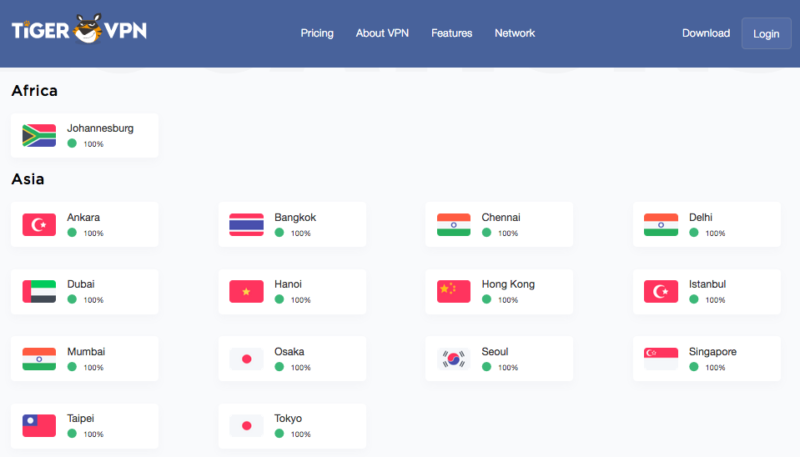
TigerVPN has 300 servers in 42 countries, and it has moved into a few underserved spaces. It has one server in South Africa and a decent four in South America. India and Turkey are also represented. It’s not as much as we like to see, but not terrible compared to other services.
The problem is the lack of growth. Since our last review of TigerVPN in 2019, it hasn’t added a single new server to its network. There’s little reason to believe users outside the usual geolocations will enjoy user-friendly speeds with TigerVPN anytime soon.
For a VPN that takes user needs into account and isn’t afraid to make drastic improvements between versions, see our CyberGhost review.
Customer Service
Customer support through TigerVPN is a mixed bag. On the one hand, you have helpful, knowledgeable professionals and a detailed knowledgebase. On the other, the website hides that knowledgebase from visitors, some of the articles are unusable and there’s a bit of a delay in hearing back from people.
When discussing TigerVPN’s UI, we remarked that its apps are user-friendly, but its website is a disaster. That also holds true when seeking customer support. From the desktop VPN app, you can get to its FAQ in two clicks. However, if you start from the website, you’ll need to sniff out a tiny “help” link buried at the bottom of the page.
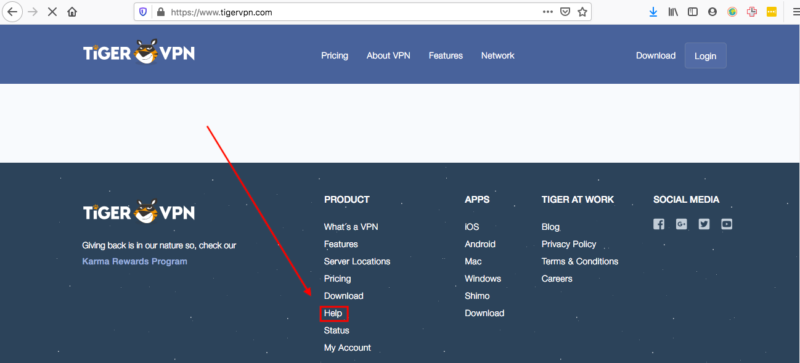
Once in the FAQ, you’ll find some articles that are clearly written, and others that look like this:
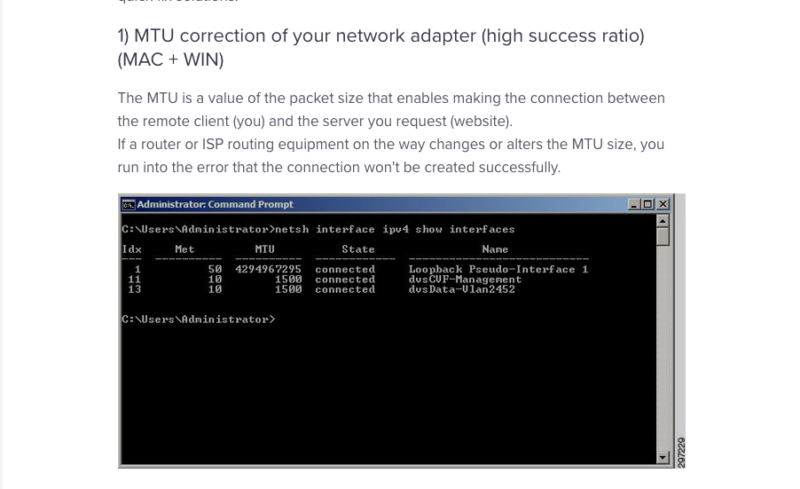
It’s disappointing that TigerVPN removes features to be more user-friendly, then turns around and expects its users to be comfortable with entering command prompts. If it wants to appeal to users who understand what an MTU value is, it should give those users more control over its VPN.
If you need help and you can’t find the answer in the knowledgebase, you can send TigerVPN an email through the button on the bottom-right corner. It takes one to two days to get a reply, but once it arrives, support usually knows the answer. It’s too bad there’s no live chat option, though.
The Verdict
In many ways, we were pleasantly surprised while writing this TigerVPN review. When we saw yet another poorly edited website with a cartoony mascot, we feared the worst. Yet there are several points about TigerVPN that serve as genuinely good reasons to recommend it. Consistent speeds, a decent UI and the ability to unlock Netflix are nothing to scoff at.
On balance, though, it’s still a disappointment. The elephant (or tiger) in the room is the near-complete absence of features. TigerVPN’s desktop and mobile apps lack some of the most basic on-off switches we’ve come to expect.
This might not be so bad if we weren’t charged top-tier prices for it. We’d pay $6 for a month of TigerVPN, but that the service asks for twice as much is nonsense. TigerVPN is not a bad VPN by any means, but without some serious growth, we don’t see it roaring into the top 10 anytime soon.

